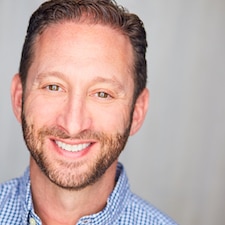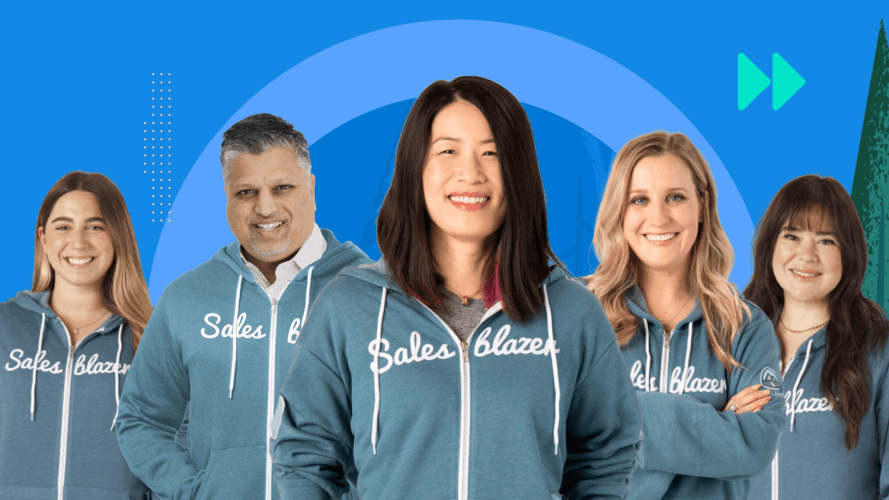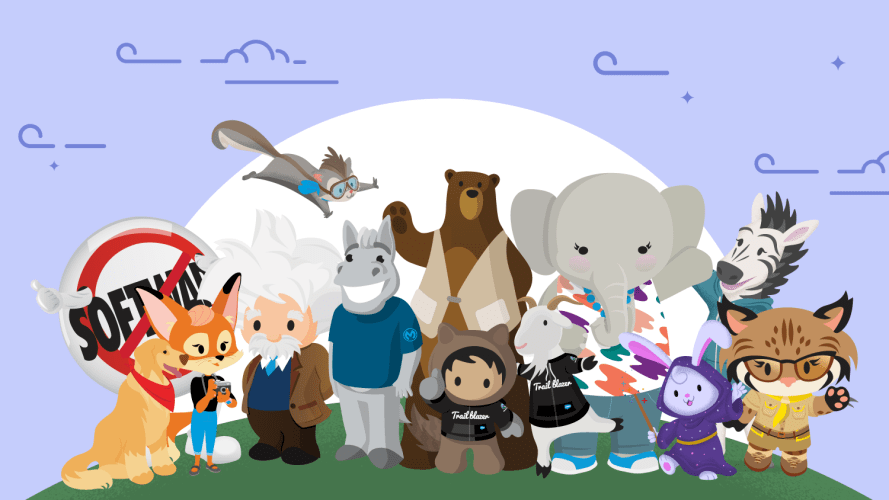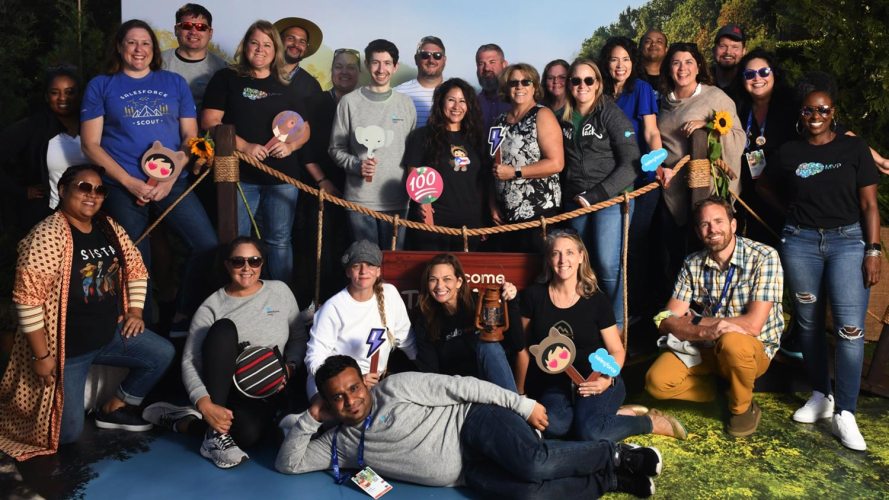How Do We Create Next Gen Leaders? The Girls Who Code Founder Explains



Reshma Saujani, founder of Girls Who Code and of the Marshall Plan for Moms, gives tips to help raise the next generation of leaders.

Ari Bendersky
If we don’t look out for kids, our next generation of leaders, who will? Today’s kids will become tomorrow’s bosses, but without access to the right tools, mentors, and opportunities, many will be left behind. Helping guide our next-gen leaders gain chances to learn important life and work skills is more important today than ever, especially with the increasing digital divide.
Salesforce Chief Philanthropy Officer Ebony Beckwith spoke with Reshma Saujani, founder of Girls Who Code and of the Marshall Plan for Moms on the latest episode of #BossTalks, Beckwith’s series on Salesforce+, about how we can all help younger people get ahead. On the episode, the two discuss a variety of topics, including:
Table of contents
Scroll down to read the transcript and watch the episode of #BossTalks.
It’s never too early to start being a boss
Growing up in Chicago with Indian parents who emigrated from Uganda in the early 1970s helped Saujani to become a strong advocate for herself and others at an early age. No matter how long and hard her father worked, he sat her on his lap each evening to read her stories about important leaders like Dr. Martin Luther King, Jr., and Mahatma Gandhi. Hearing stories of change makers set her on a path to giving back and helping others. And realizing at an early age that her family was different from others in their community allowed her to appreciate her heritage and made her want to stay true to her background.
“By the time I got to my first year of high school, I was like, I’m not going to wish my mother called me Rachel instead of Reshma,” Saujani said. “I am going to take on my brownness and I’m going to fight back, not with my fist, but with my words.”
Learn how to be a mentor
Whether working with your team or training the next generation of leaders, it’s never too late to learn how to be a great mentor.n



Next-gen leaders pay it forward
Saujani has developed a no-quit attitude, something she has passed on to her children no matter if they’re working on a school project or building a Lego set. If you start something, she said, complete it. She has always shared that lesson with young people and continues to through Girls Who Code and in everyday-life situations. One of the main messages of Girls Who Code is for participants to pay it forward and teach what they learn to another person — a sister, a cousin, a neighbor — continuing to help build the next generation of leaders and shape community.
“This idea of paying it forward and community, you understand this as a woman of color, we are always looking to make space for those who come after us,” Saujani said. “That we are uplifted together is such an important teaching I’ve taught my students. The movement is the movement because of them and that teaching.”
Failure is the best thing to happen to you
People likely prefer to succeed in everything they do, but that’s not always the case. Sure, you may stumble and even fail, but that’s when you hopefully learn and grow. It’s that failure, Saujani said, that lets you eventually succeed. She said if you aim to always be perfect, or think you’ll do everything right all the time, you can never actually be great. It’s when you make mistakes and face those mistakes head on that you can get better and eventually be your best.
“Failure is like the best thing that can ever happen to you; it is really a gift and a privilege for some,” Saujani said. “Silicon Valley entrepreneurs understand failure is great because it allows them to iterate and build their next company. So I think we had to take a page out of that and say, ‘How do we look for ways to stretch and to fail?’ But that means you have to get really comfortable with rejection and rejection can’t feel personal.”
Teach virtual internships
The pandemic exposed many gaps in society and deepened the digital divide. Many children don’t have easy access to good Wi-Fi or in-person leadership. With the rise in online education and the ability to earn micro-credentials — shorter courses, often online and sometimes free, that offer a path to gaining certification or degrees that help advance your career — Saujani suggested kids should get more opportunities to take virtual internships to help them get ahead.
“So many companies have built virtual internships and have learned how to transfer skills in a very cost-effective way,” Saujani said. “Why can’t every kid in public school, every kid of color, have a virtual internship with a financial services company or tech company and learn that skill set? We cannot leave anybody behind in terms of having the skill set, in terms of computer science or technical, because that’s the future. And that’s the job.”
Say no to yes people
As people rise the ranks — whether in various lines of business, creative fields, entertainment, and more — they can sometimes surround themselves with people who only agree with them. But if everyone always says yes to you, how do you know if your ideas actually make sense? In a way, you’re setting yourself up for failure if you don’t have trustworthy people giving you honest feedback. The people actually doing great work, Saujani said, are those who not only want to hear the truth, but accept it and incorporate it into their work.
“I actually don’t have friends who kiss up to me; I don’t have people who work for me who do that — and that’s very intentional,” she said. “When you see great leaders doing incredible things, they don’t have a lot of yes people around them. They actually have people around them that are honest and that are critical.”
Beckwith agreed with that point of view and said this is a great life lesson for the next generation of leaders: Don’t surround yourself with people who just say yes and flatter you. Having people who give you different points of view allows you to succeed more.
“When you have people in your life who tell you the truth,” Beckwith added, “you can get better and better and grow.”
Want to be a #Boss?
Catch up on every episode of #BossTalks — all streaming now on Salesforce+



Watch the full conversation between Beckwith and Saujani and read the interview transcript:
Episode transcript:
Ebony Beckwith:
Hello everyone. And welcome to Boss Talks, a series featuring candid career conversations with people who are changing the game in their industry. Today’s episode is all about building bosses. Now, despite how easy some make it look, no one just woke up like this. It takes intention, hard work, and a lot of pivoting and trying again. Trust me, I know the struggle, but it’s never too early to begin the journey to boss hood.
So today’s conversation is really focused on investing in our next generation of leaders. And you don’t have to be a parent or an auntie or an uncle to appreciate this topic, because whether you’re raising them, teaching them, mentoring them, or eventually hiring them, we all have a role to play. So to help me unpack this topic, I’ve invited my good friend and ultimate boss builder, Reshma Saujani. Reshma is the founder of Girls Who Code and the founder of the Marshall Plan for moms. Reshma, welcome to Boss Talks.
Reshma Saujani:
Thanks for having me Ebony. It’s great to be here.
Ebony Beckwith:
Reshma, I have known you for a long time. In fact, I went to work to pick up a few things at the office the other day, and I found this amazing picture of us, but I want everyone to know you a little bit better. So can you take us back to mini boss Reshma and what led you to be the woman you are today?
Reshma Saujani:
Oh my god, mini boss Reshma. I love that. My parents came here as refugees from Uganda in 1972. And even though they were both engineers, my dad worked as a machinist in a plant, and my mother sold cosmetics. And every night, no matter how tired my dad was, he would sit me on his lap. And he’d read to me these little Reader’s Digest books about Dr. King and Mahatma Gandhi.
I’m sure you’ve had this experience too, these experiences that you have when you’re young, totally informs or seeps into your mind who you want to become when you get older. And so there’s something about hearing about those change-makers, these warriors, these change agents that really made me think, “I want to be like them. I want to do something to change the world.”
And so, I led my first march when I was 13 years old. I was one of the few brown girls in my Midwestern neighborhood. And every time my mother wore a sari when she went to the local K-Mart, people would make fun of her. I’d go to school and people would ask me, “Do you bathe in curry?” I mean, just ignorant things. But by the time I got to my first year of high school, I was like, I’m not going to wish my mother called me Rachel instead of Reshma. I am going to take on my brownness and I’m going to fight and I’m going to fight back, not with my fist, but with my words.
Ebony Beckwith:
I think this is a perfect segue because you are on the front lines, you have been on the front lines since you were a little girl, apparently, of building future leaders, not only yourself, but then others. You work with so many amazing young people, which is one of the things I love about you and what kind of draws us together. Do you ever think it’s too early to start learning about becoming a boss?
Reshma Saujani:
Oh, it’s never too early. I mean, I think we have to actually look for ways and opportunities for our children to become leaders and to lead and to be passionate about things that are happening in their lives. Young people are often, are always on the cutting edge of what’s coming and the problems that our country needs to solve.
I would say it’s like we live in a moment where our children are behaving like leaders and our leaders are behaving like children. And that’s why it’s so important at a young age to give these little bosses the tools to go lead and not to have them wait for us to get it together.
Ebony Beckwith:
So I’d love for you to share some of the intentional things that you do as a mom. And then also the intentional things you do at Girls Who Code to help young girls see themselves as leaders.
Reshma Saujani:
So as a mom, we have a motto in our house of like, don’t quit. And so if we’re working on building a Lego set or if we’re working on building a toy or a project or something, and someone gets frustrated, they’re not allowed to just walk away. We sit there and we figure it out. And I’ll have moments where I’m helping Sean with a Lego set and I’ll get frustrated and I’ll be like, “I got to go do something.” He’ll be like, “No, mom. Remember, we don’t quit in our family.” And so I love that. That has really shaped both him and me. It’s like children are almost your biggest and your best teachers.
The thing about the girls that I feel like this idea of paying it forward and community, you understand this as a woman of color, we are always looking to make space for those who come after us. But when we started building Girls Who Code in the beginning, I used to always say, “You’ve been given a gift of code. There were thousands of girls that applied to be in this program. We had 100 spots, 150 spots, you got picked. And the reason why you got picked is when I read your application,” I used to read every application. “There was something that I saw in you that made me believe that when you graduated this program, you were going to go to your sister or your niece or a girl at … your neighbor and you were going to encourage her to learn how to code, or you were going to teach her to learn how to code.”
And so what people don’t know is we have 10,000 Girls Who Code clubs and people always say, “Well, how’d you do that?” And I said, ” Because that first couple of years, every girl that went through our program would go teach someone.” She’d go to her school, she’d start a club, she’d start something in her library, her community center, her church, her synagogue, her mosque.
And so this idea of community in sisterhood and that there’s … it’s not like you get this one spot and then you slam the door, but that you were always generous with your knowledge, your time and your resources. And that we are uplifted together is such an important teaching that I’ve taught my students and I’ve seen … the movement is the movement because of them and that teaching.
Ebony Beckwith:
So for everyone else who’s looking to be a boss builder, what are some of the things that we all can do to help do just that, inspire confidence in young people and help lift them up?
Reshma Saujani:
I mean, I think I recognize that there are so many young girls out there who don’t have role models or mentors, who don’t know that someone like you, Ebony, running philanthropy at Salesforce. And so as much time as we can give to go back to our high schools or our middle schools or our churches, and just take 20 minutes and tell your story.
I’m sure you were like me. It was those seminal programs that I went to that were for students of color that allowed me to be who I am today. It mattered. Having a Girls Who Code program mattered because I got exposed to people who looked like me, and I realized that I could do it too. And so I think finding those moments to give back and to share. I think always being generous with your resources and your time. For me, I’m like, take it. Whatever I get, I give back. I don’t hold anything precious.
Ebony Beckwith:
That’s great. That’s really great advice and I hope everybody’s writing that down. But I also want to touch on how people, young people especially, handle failure. And I think that social media is really causing young people, everyone really, to be extra hard on themselves and really hard on each other. So what advice do you have for people trying to bounce back from mistakes or that feeling of defeat?
Reshma Saujani:
A failure is like the best thing that can ever happen to you. I always say I’m obsessed with Serena Williams and Serena sits at the edge of her ability in a coach who’s saying, “Do it again, do it again, do it again.” In order to become GOAT, the greatest on earth, she had to miss a lot of balls. She had to fail, because it’s only when you fail that you know how to get better.
And so if you do everything perfectly and everything right, you’ll never be great. And so failure is really a gift. And it’s funny in many ways in our society, failure is a privilege for some, like Silicon Valley entrepreneurs understand that failure is great because it allows them to iterate and build their next company, and their next company, and their next company. And so I think we had to take a page out of that and say, how do we look for ways to kind of stretch and to fail and to … but that means that you have to get really comfortable with rejection and rejection can’t feel personal.
So the two hacks that I have on that is, one, if something doesn’t work out for me and I feel really bad about it, I give myself a finite time to grieve about it, drink a lot of margaritas, and then I move on. So when I lost my congressional race, I said, “I have a month to ask the question to my husband. What happened? What’d I do wrong? What’d I do wrong,” feel sorry for myself. But after that month, I was not allowed to go down that hole anymore. It was done.
The second thing is, as part of being comfortable with failure is failure not feeling personal and you inoculating yourself from that feeling that it’s personal. And the way to do it is to seek out rejection. So every time I give a speech or I go on television, I ask people around me, how did I do? I mean like, what did I do wrong?
Recently I was on MSNBC. And I could know when I was doing the interview that I just wasn’t feeling it. I was off, and I knew it. And I finished and I went downstairs and I looked at my husband, I’m like, “How’d I do?” and he was like, “Not your best.” [inaudible 00:09:43] director, “How was it?” “We got to work on it tomorrow.” Of course, you don’t want to hear that. You’re tired, it’s Sunday. But listen, I knew that if I was going to bring it, and that means that if I wasn’t connecting, someone had to tell me that so I could practice or work on my talking points and get great. And so I think that that’s the way that you have to look at it.
Ebony Beckwith:
So what do you think are the most critical skills we need to teach now? Both the hard skills and the soft skills that folks need to learn?
Reshma Saujani:
Look, for me, I wonder if it’s really about skills and talent than it is really about structures and changing the structures. Now, I think where it is about skills is I think the past year and a half were brutal for kids of color because of the digital divide. And there were far too many kids, and I saw this with our own students that could not log on to school because they had disparate wifi or had one device in the family. And you know how it is when you’re on a call, you’re just like, forget it.
So many kids experienced that and now they’re behind. And so how do we level them back up? One of the things that we’ve been talking a lot at Girls Who Code about is this idea of like micro-credentials. So, so many companies have built virtual internships. They’ve learned how to transfer skills on in a very cost-effective way. Why can’t every kid in public school, every kid of color have a virtual internship with a financial services company or tech company and learn that skillset? We cannot leave anybody behind in terms of having the skillset, in terms of computer science or technical, because that’s the future. And that’s the job.
And I do think with our kids, there needs to be a leveling up from what we’ve lost over the past year and a half. I think for the talented women who have left the workforce, I think it’s really about an opportunity. And I think Salesforce is really leading the way in many ways on this of saying, well, look, work’s not going to look like how it did before. And how do we see that as an opportunity to get more diverse talent, to decrease attrition, to get more talented people who weren’t able to do the nine to five desk job because of other responsibilities, other caretaking responsibilities?
Ebony Beckwith:
That’s right. We got a lot of questions on Boss Talks about how to take action. How do you switch careers? How do you make those moves? How do you get those skills that you need? Are there any programs or courses that you think are doing a good job of skilling up future talent?
Reshma Saujani:
Listen, I always think there’s so much out there. So many universities have opportunities for you to get an advanced degree or an online degree now. It’s easier, especially over the past year and a half. And so I think that you should look for that. But one of the things I always say, people just to build that muscle, because I think we get we’ve … we learn how to play it safe. And the older you get, the more you … the longer you stay in your job, the harder it is to leave, the harder it is to make a hard left and to do something new. So more than just even learning another skill set, how do you build that bravery muscle?
So for me, I actually learn a physical … I do a new physical activity every couple of months to build that muscle of feeling uncomfortable.
Ebony Beckwith:
Love that.
Reshma Saujani:
I don’t know how to swim. So this summer, I said, “I’m going to learn how to swim, and I’m going to learn how to play tennis.” Neither one of which I knew really how to do. So I had to start from a baseline of zero, feel annoyed in that, because we’re similar, I like to be the best. So I don’t like to be on the court feeling like I’m barely getting the ball over the net or feel like I’m drowning in a two feet pool. So sitting in that uncomfortability is really important. Building that muscle, learning something new is really important. I’ve really helped translate those things into other things.
Ebony Beckwith:
I think part of being a boss as well is not surrounding yourself with yes people. And I think especially as you move up in life and in your company, the more people tend to tell you what you want to hear, not what you need to hear. So seeking out those truth tellers, whether it be our spouses or our PR people or whomever, it may be our really good friends who you can hear the truth from. It’s really nice to have those people in your life who you can depend on to be honest with you, because you need that … we all need that to get better and continue growing. And I think that the fact that you said you seek those people out is another boss move, making sure you have those people in your life is really important.
Reshma Saujani:
It’s so true, Ebony. I actually don’t have friends who kiss up to me. I don’t have people who work for me who do that, and that’s very intentional. And so when you see great leaders, when you see people doing incredible things, they don’t have a lot of yes people around them. They actually have people around them that are honest and that are critical.
Ebony Beckwith:
I think that such a good life lesson is when you have people in your life who tell you the truth, you can get better and better and better and grow. That leads me to my next question. As I mentioned earlier, not everyone tuning in is a parent or has a young person or child in their life, but we all have a role to play in developing our future leaders. So what advice do you have for people who want to get involved in this work?
Reshma Saujani:
Well, one is I look out for those people, is it the kid that lives in your building? Is it your neighbor? You don’t have to have, like you said, a child or a nephew or niece to be a role model. Look for ways to go to your school or your university and go back and give back.
Part of, I feel like, our job is to every person has what we say is your Dharma, what you’re supposed to be … put on this earth to do. And I think all of us just need a little guidance to figure out what that is. And then once we figure out what that is, to have the confidence to actually pursue it.
And so I think all of us sit in the space of actually looking for that. Every time I meet a young person, I’ll be like, “So what are you interested in? What are you passionate about? What are you thinking about?” And always engaging. When you see young people in that … even if you’re at the grocery store, because you could say one thing at the right time and it could ignite an idea or stop somebody from talking themselves out of their best idea.
Ebony Beckwith:
All right. We have come to my final and favorite question. It’s one that we ask of all of our guests. So I’m excited to hear your response. So Reshma, what is your superpower?
Reshma Saujani:
My superpower is probably my hustle and I never, ever give up. And I think when I get on something, I’m like a dog to a bone. When I get fired up, especially about something, I can’t let it go.
Ebony Beckwith:
I love that. That’s totally your superpower. Well, Reshma, thank you so much for joining us on Boss Talks today and thank you for everything you’re doing to help build future bosses. We love having you on the show.
Reshma Saujani:
Thank you, and I’m so grateful for your leadership. You have no idea how many young people that you inspire.
Ebony Beckwith:
Thank you. Thank you for all your support. I know this is a popular topic with all of you, so let’s hear your questions.
Wassim Khemici:
Hey, Ebony. I’ve got a couple questions for you. First, what’s your advice on bouncing back after dropping the ball during a high stakes work situation, especially during a new job? My next question is what’s your advice on building an authentic personal brand while still conforming to corporate standards?
Ebony Beckwith:
Well, thanks for the questions, Wassim. I’m going to tackle them one at a time. So let’s start with what to do after you drop the ball. First of all, I think we just all have to accept the fact that none of us are perfect. Everyone makes mistakes. I have a personal motto that I learned years ago, “It’s progress, not perfection.” You’re not going to get it right every time and that’s completely okay.
But when you make a mistake, what your colleagues or your boss want to hear is that you learned from what happened and that you’re already thinking of ways to make sure it doesn’t happen again. So you learn from that failure or mistake, and that’s what’s truly important. And I think trust is what’s at the core of all of our interactions. So if your team knows it, that they can count on you, you’ll all be able to bounce back stronger and that’s even after a mistake, that’s what really builds that trust in teamwork. So I think just making sure that you’re learning from that moment, being honest and humble is the best approach.
Now, for your question on personal brand, I think it’s important to know that your brand is not an either/or situation, meaning you don’t have to choose between your authenticity and your company. It’s about finding the balance between the two. And for me, it was really helpful to create a personal brand filter, if you will. So when something crosses my desk, I can quickly vet it to make sure it aligns with my core values. And that’s how I’ve been able to find that balance. So hopefully that’s something that you’ll find helpful as well.
I hope you all enjoyed today’s conversation. For more Boss Talks, be sure to check back here on Salesforce Plus, so you never miss an episode. And to continue boss building, head over to trailblazer.salesforce.com to join millions of trailblazers who are learning relevant skills, connecting to fellow trailblazers and giving back with the trailblazer community. With that, thank you for tuning into Boss Talks. And we will see you all next time.
























